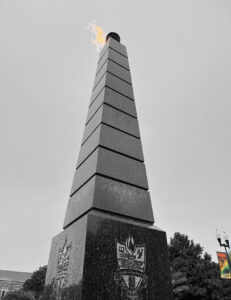
Campaign season at Florida A&M University came to a remarkable ending as students elected a new president, vice president and Royal Court.
Campaign season is one of the most memorable and exciting parts of the spring semester for some students. However, the majority of the student body does not share that sentiment.
FAMU’s enrollment this school year is almost 9,000, and not even a quarter of the students voted in the recent elections.
Voter turnout dropped to its lowest in the 2020-2021 school year — the first full year of then pandemic, when classes went to remote mode — with less than 3,000 participants. For campus-wide general elections like Student Government Association president and Mister and Miss FAMU, voter numbers barely scraped over 2,000. Only 2,076 students voted for their next student body president and vice president.
FAMU is notorious for its campaign season with a week-long process of catchy slogans, creative advertising and free snacks on the quad. However, due to COVID-19 restrictions, candidates were forced to move their campaigning to a remote platform last year. Many students blamed the closed campus for the lack of participation.
Candidates and other students hoped that voter turnout would see a shift in numbers with the campus slowly opening back up again. But it seemed as though it was still a struggle to get students to the polls.
Kerra Kelly, electoral commission precinct supervisor, believes that the classes brought in under COVID-19 restrictions have impacted voter turnout.
“There is a lack of understanding,” Kelly said. “Basically, we have two freshman classes. Technically, I think that, you know, diminishes their experience to really know what a FAMU election entails and how important it is.”
In the 2021-2022 academic school year elections, voter turnout almost doubled in size, but the numbers still remained minuscule. The Miss FAMU race received the lowest number of votes among the general election categories. Only 2,878 students voted for the next Miss FAMU. The highest number of votes went toward the SGA president and vice president, with a turnout of 3,455 votes.
Although campaigning has officially been moved back on campus, students have noticed a difference in the atmosphere. Senior theater major Mikia Holsey decided not to vote because, she said, the desire and excitement to vote were missing this season.
“Campaigning was a bit different,” Holsey said. “Before COVID-19, it was a little bit more fun, and people were more active on campus.”
Some other students believe that one of the main causes of the decline in participation is the quality of candidates. Second-year pharmacy major Gabrielle Darbeau argues that the student body puts too much emphasis on the Royal Court and SGA positions.
“I genuinely think people aren’t voting out of spite,” Darbeau said. “It’s like what you see on Twitter when people start sending out their campaign GroupMe’s, it’s like, you’ve never spoken to me a day in my life.”
Voting in FAMU elections is based on credit hours. If a student is a first-year student but exceeds the 30-credit hour limit, then they are considered a sophomore in the iRattler system. For class-specific candidate races like sophomore class president or miss sophomore attendant, the ballot for these positions will only be sent to students classified as a sophomore. Many students who came in with their class did not get to vote for their class representatives due to their excess credit hours. After many discrepancies with the same situation in the 2020-2021 elections, students started to wonder whether they should even vote at all.
SGA Vice President Marcus Thomas is disheartened to hear that student participation is low when referring to campus elections. He maintains the ideal that every vote helps determine the future of FAMU.
“Voting is something that is the students’ voice,” Thomas said. “Students hear a lot of issues, deal with a lot of issues, and this is their chance that really makes a matter of how they get to make a change.”